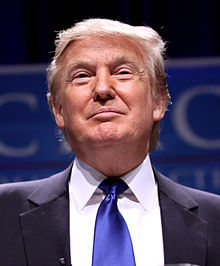
‘Blame’ for Trump assigned
It may seem too early be be figuring out who is to "blame" for Donald Trump's nomination as the GOP standard-bearer (for starters, he hasn't actually been nominated yet, and second, he could yet go on to pull off what seems now would be a surprise victory in November). But Charlie Cook, a well-regarded political analyst, has opted to get a jump on things in this morning's National Journal:
Republicans Have Only Themselves to Blame for Trump
The truth is that Republicans were not in a mood to nominate Jeb Bush, Chris Christie, John Kasich, Marco Rubio, or any other establishment-oriented candidate. They also despised Ted Cruz so he would never do. None of the other alternatives measured up. They were so angry with the government that they wanted to fire a shotgun blast at Washington. They ended up shooting themselves in the foot. They got Donald Trump and a gimpy party.
In other words, Republicans thought sending a message was more important than beating Hillary Clinton and taking back the White House. So I guess Clinton and the White House weren’t important enough for them to dial back their lofty principles. The perfect was indeed the enemy of the good.
A national online survey of registered voters, drawn from a larger sample of 11,705 by Survey Monkey conducted June 27 to July 3, found that Clinton led Trump by 5 points, 48 to 43 percent, which was pretty much in line with most other recent polls. But when matched against Mitt Romney, the two were tied at 45 percent. House Speaker Paul Ryan edged Clinton by 2 points, 47 to 45 percent, and Ohio Gov. John Kasich bested her by 8 points, 50 to 42 percent. The poll found that while Trump pretty much pulled together the Republican vote, he was at a distinct disadvantage among pure independents and Democratic-leaning independents, groups that were happy with Kasich and satisfied with the others.
We are now starting to see Clinton widen her lead over Trump. The Pew Research Center conducted its first general-election poll between June 15-26. In a survey of 2,245 voters, Pew found Clinton leading by 9 points, 51 to 42 percent. Interestingly, 55 percent of Trump supporters conceded that they were voting against Clinton, not for Trump, with just 41 percent actually supporting the Republican. As for Clinton, 50 percent of her backers said they were casting a vote for her, but nearly as many (48 percent) said they were voting against Trump. A Democracy Corps national survey conducted June 23-28 among 900 likely voters by Democratic pollster Stan Greenberg found Clinton with an 11-point advantage, 48 to 37 percent, with a typical Democratic candidate for the House holding an 8-point advantage, 49 to 41 percent (the candidate names and parties are indicated to the interviewee when known, otherwise just the party is given).
Cook himself notes that the election is still four months away, and anything can happen. But at the moment his analysis is worth considering.



